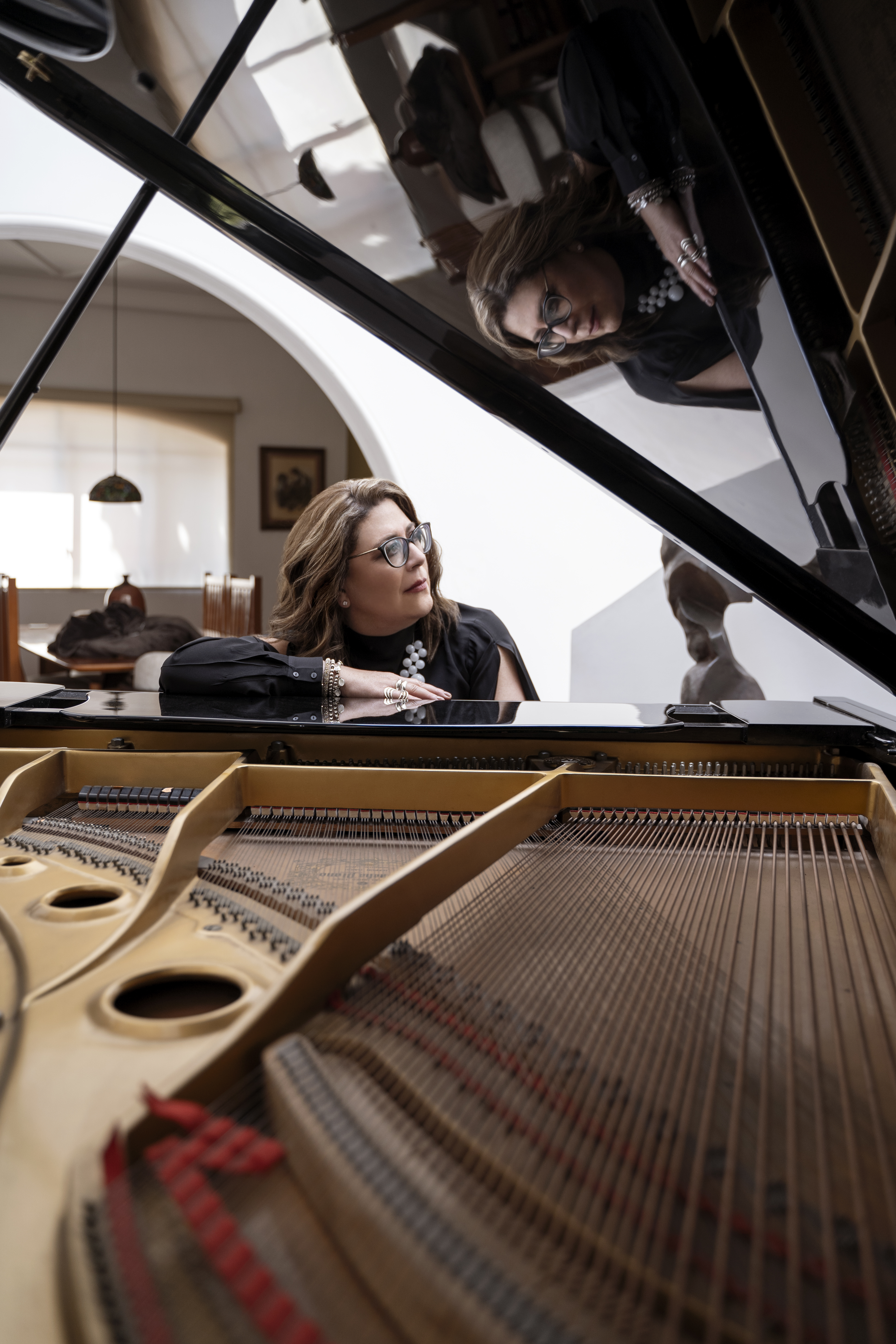BIOGRAPHY
Short bio:
Born to a musical family in Mexico City, Gabriela Ortiz has always felt she didn’t choose music—music chose her. Her parents were founding members of Los Folkloristas, a renownedensemble dedicated to performing Latin American folk music. While playing charango and guitar with her parents’ group, she was also learning classical piano. Her formal studies began under esteemed Mexican composers Mario Lavista, Federico Ibarra, and Daniel Catán. Later, shecontinued her studies in Europe, earning a master’s degree at Guild Hall School of Music andDrama under the guidance of Robert Saxton, and earning a doctorate in composition andelectronic music from London’s City University under the guidance of Simon Emmerson.
Ortiz’s music incorporates seemingly disparate musical worlds, from traditional and popularidioms to avant-garde techniques and multimedia works. This is, perhaps, the most salientcharacteristic of her oeuvre: an ingenious merging of distinct sonic worlds. While Ortizcontinues to draw inspiration from Mexican subjects, she is interested in composing music thatspeaks to international audiences.
A landmark achievement in her career came in 2025 when her portrait album Revolucióndiamantina, recorded by the Los Angeles Philharmonic and Gustavo Dudamel, won three GRAMMY Awards, including Best Contemporary Classical Composition for the title track. This historic recognition solidified her as a leading voice in contemporary classical music.
From massive works for orchestra and chorus such as Yanga (2019), concertos as Fractalis(2022), politically charged operas as Only the Truth (2008), magical chamber works as Altar demuertos (1997), and intimate solo pieces as Canto a Hanna (2005), Ortiz’s music reveals asophisticated compositional technique and a meticulous attention to rhythm and timbre. Herwork has been performed by prestigious orchestras and ensembles such as the BerlinerPhilharmoniker, New York Philharmonic, Royal Liverpool Philharmonic, Los AngelesPhilharmonic, BBC Scottish Symphony Orchestra, and São Paulo State Symphony Orchestra.
Ortiz’s many accolades include the 2022 Bellas Artes Gold Medal, Mexico’s National Prize for Arts and Literature, a Guggenheim Fellowship, a Fulbright-García Robles Fellowship, and two Latin GRAMMY nominations. She is a member of the Academy of the Arts and has been inducted into El Colegio Nacional, Mexico’s most esteemed circle of intellectuals.
Ortiz is currently composer-in–residence at Carnegie Hall, the Orquesta Sinfónica de Castilla yLeón, and the Curtis Institute of Music. She also teaches composition at Mexico’s NationalAutonomous University. Her music is published by Boosey & Hawkes.
Biography written with contribution from Ana Alonso Minutti
Long bio:
Born to a musical family in Mexico City, Gabriela Ortiz has always felt she didn’t choose music—music chose her. Her parents were founding members of Los Folkloristas, a renownedensemble dedicated to performing Latin American folk music. While playing charango and guitar with her parents’ group, Ortiz was also learning classical piano. Her formal studies began under esteemed Mexican composers Mario Lavista, Federico Ibarra, and Daniel Catán. Later, shecontinued her studies in Europe, earning a master’s degree at Guild Hall School of Music andDrama under the guidance of Robert Saxton, and earning a doctorate in composition andelectronic music from London’s City University under the guidance of Simon Emmerson.
Ortiz’s music incorporates seemingly disparate musical worlds, from traditional and popularidioms to avant-garde techniques and multimedia works. This is, perhaps, the most salientcharacteristic of her oeuvre: an ingenious merging of distinct sonic worlds. While Ortizcontinues to draw inspiration from Mexican subjects, she is interested in composing music thatspeaks to international audiences.
Gustavo Dudamel, a longtime champion of Ortiz’s music, stated: “Gabriela is one of the mosttalented composers in the world—not only in Mexico, not only in our continent—in the world.Her ability to bring colors, to bring rhythm and harmonies that connect with you is somethingbeautiful, something unique.” Under Dudamel’s direction, the Los Angeles Philharmoniccommissioned and premiered seven works by Ortiz in recent years, including her ballet Revolución diamantina, the violin concerto Altar de Cuerda, and Kauyumari for orchestra.Dudamel introduced the piece Téenek (“one of the most brilliant I have ever directed”) toGerman audiences in 2023, performed by the Berliner Philharmoniker. In 2024 soloist AlisaWeilerstein joined Dudamel and the Los Angeles Philharmonic for the world premiere of Ortiz’snew cello concerto Dzonot.
A landmark achievement in her career came in 2025 when her portrait album Revolución diamantina, recorded by the Los Angeles Philharmonic and Gustavo Dudamel, won three GRAMMY Awards, including Best Contemporary Classical Composition for the title track. This historic recognition solidified her as a leading voice in contemporary classical music.
Ortiz’s music has been commissioned and performed by the New York Philharmonic, LondonPhilharmonic Orchestra, National Orchestra of Bretagne, BBC Scottish Symphony Orchestra,The Royal Liverpool Philharmonic, São Paulo State Symphony Orchestra; Esa Pekka Salonen,Louis Langrée, and Carlos Miguel Prieto, among others. She has also collaborated withpractically every orchestra, conductor, soloist, and ensemble in Mexico.
Her scores for dance, film, and theater—including the operas Only the Truth, Ana and herShadow, and Firefly—frequently explore complex contemporary themes, like environmental concerns, racism, sexism, and globalization. She has written music for Errant Manoeuvres,performed by the Emma Diamond Dance Company at the Merce Cunningham Studio in NewYork; as well as the music scores for award-winning film Frontierland (produced and directed by Rubén Ortiz and Jessie Lerner) and Por la Libre (produced by Alta Vista films and directed byJuan Carlos de Llaca).
Ortiz’s many accolades include the 2022 Bellas Artes Gold Medal, Mexico’s National Prize for Arts and Literature, a Guggenheim Fellowship, a Fulbright-García Robles Fellowship, and two Latin GRAMMY nominations. She is a member of the Academy of the Arts and has been inducted into El Colegio Nacional, Mexico’s most esteemed circle of intellectuals.
Ortiz is currently composer-in-residence at Carnegie Hall, the Orquesta Sinfónica de Castilla y León, and the Curtis Institute of Music. She also teaches composition at Mexico’s National Autonomous University. Her music is published by Boosey & Hawkes.
Biography written with contribution from Ana Alonso Minutti

